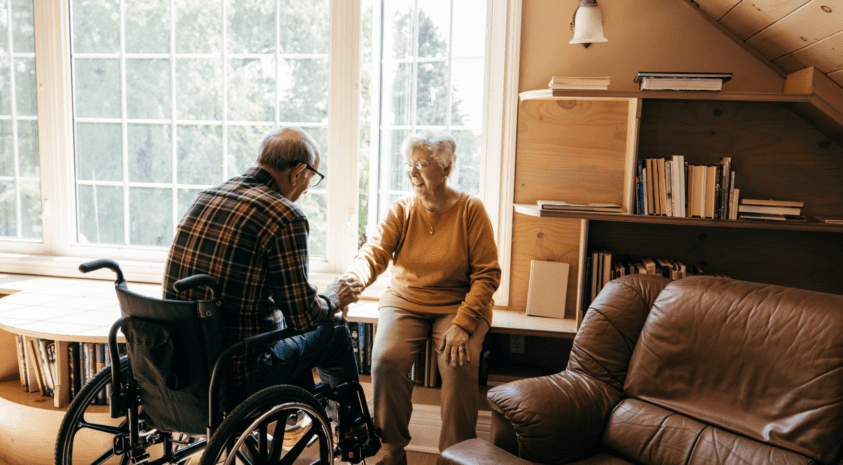It’s the day many parents think about for years, dropping their child off at college for the first time. As a mom of four boys ranging in age from 11-21, we’ve had a lot of firsts over the past two decades and this was another one of those days.
Even though our son was living only a few towns away from us on campus, we left the college that day as a family of three. Life was looking a bit easier and less complicated with only one child in the house. After basking in this newfound ease, 24 hours after dropping our son at college, I got a call from my mom saying that my 82-year-old dad was headed to the ER and things weren’t looking good.
As a family, we’re careful planners. My parents had set up a trust years ago, they had saved and lived lean in retirement removing concerns about outliving their money, their burial plot was purchased, we communicated regularly about hard things like end of life wishes, my dad had even written his own obituary years before but nothing could have prepared us for what was to come.
After a few days in the hospital, my dad was abruptly sent home via ambulance with no support in place or even simple things like a hospital bed or wheelchair to use. He was totally unable to walk or care for himself. My mother was frantic plus it was a long holiday weekend so I dropped everything and scrambled to get a rental wheelchair, buy a commode, borrow bed rail guards from friends and gather as many things as I could for his arrival. A hospital bed had been ordered but wouldn’t be there for a few days so my husband and I quickly disassembled our youngest son’s twin bed leaving him to sleep on the floor temporarily while we hauled his bed to my parent’s home and set it up in their dining room. We had to move all of their dining room furniture to another room. It was hectic and stressful and I kept thinking to myself, what if I didn’t have an SUV to move our son’s bed and mattress into their home? What if I didn’t have a vehicle at all to drive all over creation gathering items to help my parents? What if I didn’t have the money to do all of these things? What do people do in a situation like this? What if someone is totally alone with no family?
It was a crisis but through every crisis you learn valuable lessons. It’s now been a little over two months since that time and my dad is doing better but still has a long road ahead. I’ve learned a lot and hopefully my learnings will help other families lessen some of the stress we endured during an already stressful time. I’ve got nine tips below to help you plan for what is likely inevitable as your parents age but these tips can apply to all of us!
1. Start Prepping Your Home NOW for Aging in Place No Matter What Your Age
My parents live in an historic home built in 1800’s which is beautiful but it’s not conducive to someone in a wheelchair. It’s never too early to start making small changes to your living space through the lens of being physically limited or needing extra help in the future. Even though we were young, when my husband and I added an addition to our small home we made sure we had one floor living for when the time came for our own aging issues. Many of these changes will benefit people of all ages including young grandchildren so it’s a wise investment for all. Some ideas we found helpful were:
- Install grab bars in your tub and showers, near toilets or in rooms that have a few steps.
- Add an additional railing to staircases inside of your home and outside too for extra safety. Having a double railing either side of a staircase can make a huge difference in safety for everyone.
- If your primary bedroom is on the second floor, see how you can adapt your home to have one-floor living whenever possible so stairs won’t be an issue.
- Remove or replace doorway thresholds within the home for easy wheelchair use. There was a high wooden threshold between my parent’s dining room and kitchen that was almost impossible for my dad to get over in his wheelchair. This also helps prevent tripping.
- Remove all throw rugs or kitchen floor pads. Anything that can prevent tripping is a good thing for all.
2. Update Legal Documents and Make Clear Decisions
I cannot stress this enough but having an airtight updated will and/or trust is key. My parents had a trust that was updated a few years ago but it didn’t reflect their current situation. We also needed to update health care proxy forms and making sure copies of my dad’s do not resuscitate wishes were visible near the front door in case we had to call 911 again. This has now changed as his health has improved but what we often think of as “one and done” legal documents aren’t. Just as you evolve and enter new phases of your life your legal life should evolve as well. What you decided upon even just five years ago may not apply any longer. Always check with your lawyer before making any decisions and investigate an elder law attorney as there is expertise needed that a regular family lawyer cannot address.
3. Get to Know Your Local Council on Aging or Senior Services Dept.
Thankfully, my parents were already involved with their town council on aging and had attended some of their groups and events. My mom and I met with the director of the council and she was a wealth of information on how to borrow medical equipment and other resources available to my dad. Most cities and towns have their own council or service, find out and get in touch by calling your town or city hall as they’ll likely be an invaluable resource.
4. Consider a Medical Alert System
Having a medical alert system can help everyone feel a bit more confident. Do your research as some are better than others and contracts can vary.
5. Listen and Be Gentle to Yourself and Loved Ones
It’s hard to face limitations no matter what your age or stage of life. When you’re independent and do what you want when you want there’s a real grieving process when your situation now has limitations. Listen to your loved one and approach them in a gentle way looking at the situation through their eyes. As adult children, we often have our own concerns but we need to always be mindful of how the changes that are happening impact our parents or loved one.
6. Identify and Communicate Your Wishes and Needs to Others
One of the joys of my mom’s life is to putter in her yard tending to her plants and enjoy being outside. When I gave her respite, I came without an agenda of what she should do while I was there. I remembered when my boys were small, well-meaning friends would tell me to go and take a nap when I had help but what I wanted most was to organize and clean up my house. That’s what I needed and it made me feel better even though it didn’t make sense to others. It may be hard but listening to your loved one’s needs or if you’re the caregiver, expressing your needs and wants so that you’re heard will make life easier.
7. Keep Your Sense of Humor and Learn to Laugh
Our family has had significant challenges and difficulty over the years. One thing my parents taught me was to be able to laugh in the face of hardship…even one small funny thing can change your whole mindset, approach and attitude. No matter what you’re facing, there’s probably something humorous you can find in your situation or your day which can help ease stress.
8. Do a Trial Drill Now to See What Gaps You Might Have
One thing that came out of my dad’s crisis is it forced me and my husband to update our own legal documents and ultimately form a trust for our boys instead of the will we had up until that point. No one wants to make big decisions when they’re in a crisis so taking some time now to theoretically imagine a scenario of “what if?” will help you identify areas that need work. That might be updating parts of your house like point # 1 above or getting your finances in order. Just don’t wait as you will hit a bump at some point, it’s just a matter of when.
9. Face the Future Boldly and Realistically
No one wants to think of themselves aging but we all do. Some of us might end up wheelchair or bedbound and how would that look in your home? You’ll want to plan for the worst but expect the best as life happens and it happens fast so making the necessary changes to your living spaces, financial planning or whatever else you need to do to prepare will help prevent scrambling during a crisis.
Want more? Read our blog 5 simple ways to care for a caregiver
We’re here for you!
Bankers Life is here to help customers with their financial and insurance needs so please visit us at BankersLife.com to learn more.



